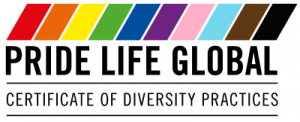
COUNT ME IN!
YOU ARE INCLUDED IS THE THEME OF THIS YEAR’S WORLDPRIDE IN COPENHAGEN IN AUGUST. WE TALK TO PEOPLE WHO ARE COMMITTED TO WORKING EVERY DAY FOR AN INCLUSIVE AND DIVERSE SOCIETY FOR LGBTQ+ PEOPLE AND THEIR ALLIES.
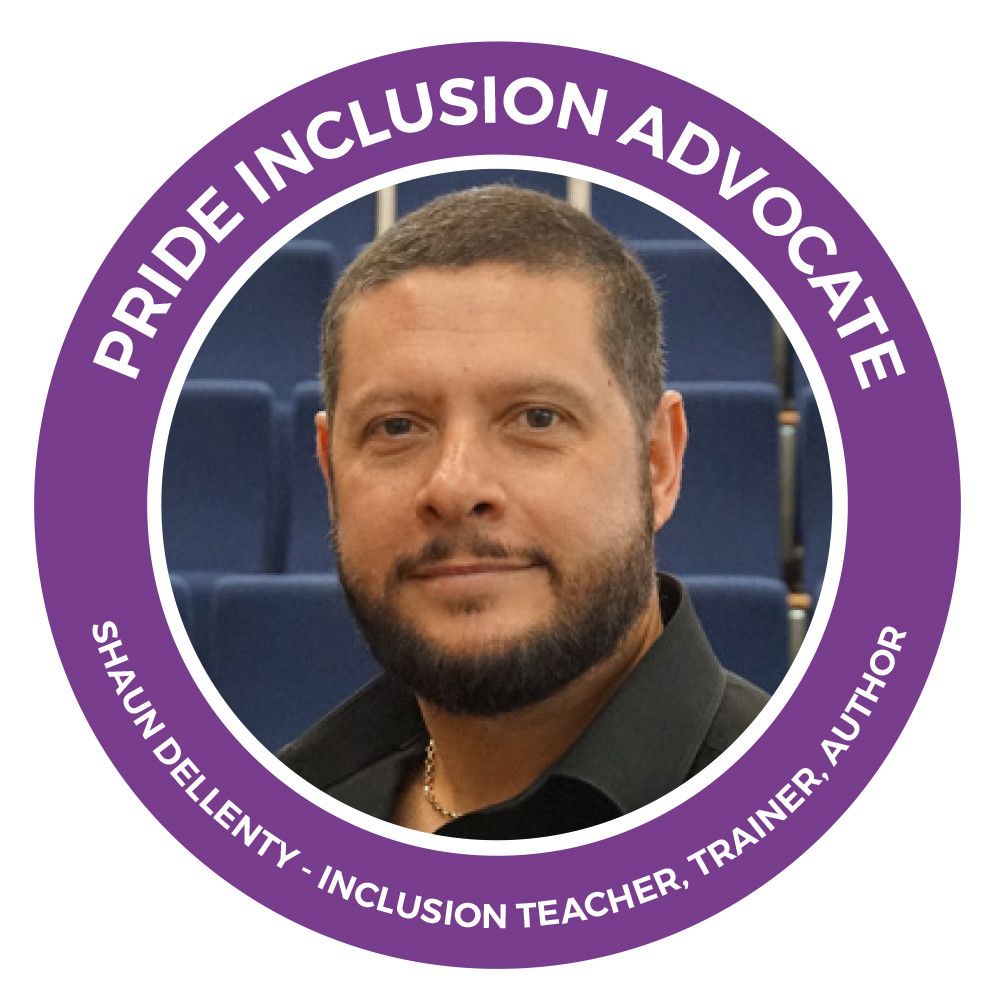
SHAUN DELLENTY
Inclusion Teacher Trainer Author
What prompted you to come out to your school community in 2009, and go on to devise the Inclusion for All programme?
In November 2009 my (then) London primary school undertook pupil bullying questionnaires to assess attitudes and behaviours at “ground level”. The resulting data shocked me.
Seventy-five per cent of our primary-aged pupils experienced direct homophobic bullying (often covertly) on a daily basis (whether or not they identified as LGBT+) with 98% hearing the expression “that’s so gay/ it’s so gay”. There was also evidence of transphobic language and perpetuation of the myths that only gay people get and spread HIV.
As a school leader I had a duty of care to not only tackle bullying related to actual or perceived LGBT+ identities but also to prevent it. We had to act to keep our young people safe and so in January 2010 I came out as gay in an assembly to my whole school community, in order to share my own journey and perhaps serve as an out and proud primary school leader.
My own coming out proved to be one of the best days of my life, the children, staff and parents were very supportive, some still write to me about it to this day and how it made them feel like they belonged and were valued, whoever they might be.
Having made significant positive change in my own school I then took this work across the UK, working with around 100,000 educators since 2009 in addition to working across 25 countries.
How great was the problem in homophobia back then in learning communities?
In 2012 the Stonewall School Report revealed that more than half of lesbian, gay and bisexual young people experienced homophobic bullying in Britain’s schools.
The Equality Act 2010 significantly helped by naming sexual orientation and gender reassignment as statutory “protected characteristics” and over time it became easier to engage positively with learning communities. I believe that LGBT+ inclusion in education should never occur solely as a result of legislation (although it clearly helps) but as a result of the moral duty upon all educators to make all young people in their care feel safe, validated, and represented, in order to fulfill their individual potential as naturally diverse human beings.
Since I started my advocacy in 2009 we have also seen government funding for anti-HBT (homophobic, biphobic, transphobic) bullying projects, although this has now rather shamefully been pulled under by the current government. We have also seen the introduction of statutory LGBT+ Inclusive sex and relationships teaching in schools, a huge contrast to the days of Section 28. But despite all the hard work and progress we are seeing increased isolation and mental health problems as a result of Covid and an upswing in strategic and co-ordinated attacks on individuals and organisations working in the field of LGBT+ inclusion, especially around trans identities. This along with an increase in hateful rhetoric on social media platforms shows we still have a long way to go.
How can we all help to eliminate homophobic bullying and prejudice?
Small steps make a huge difference: speak out, share your story, seek and serve as allies and know that your voice can change the world for the better, even if you think it can’t. You don’t have to be rich or a school leader, a hero or an influencer, what you really need is passion for making the world a kinder place for everyone.
What advice would you give to a child today who is questioning his or her sexuality?
Be loving, kind and patient with yourself, there is nothing wrong with you and there is no rush to define yourself anything other than by your name and “human being”. If you are being bullied in school we are now in a time and place where schools have a legal duty to protect you from bullying (of all kinds) so make sure you seek out the school anti-bullying policy and always reach out for help in school when things get tough there or online. You are loved and you belong here, you are a precious unique human being who absolutely deserves your time and place on this Earth without fear of bullying and discrimination from within or without the LGBT+ community.
Be safe, be kind, be proud, be you, and be free to shine brightly.
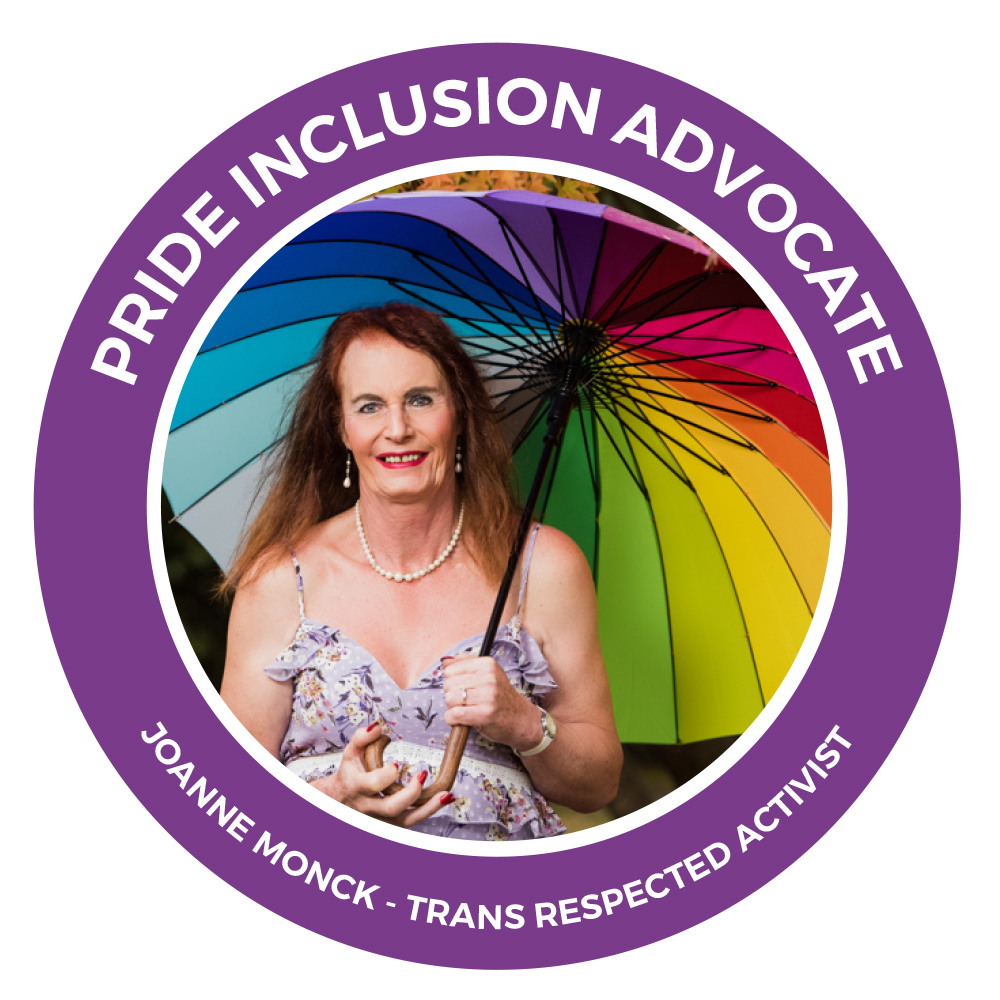
Joanne Monck
Trans respected activist
Were there any challenges that you faced along the way to your transition?
Yes, of course, there were challenges. In the early days of my transition I had to overcome being stared at, being misgendered, and occasional verbal abuse. The biggest challenge was telling my twin sons and my father. My sons were totally understanding; even my father was accepting.
How has Sussex police responded in a positive way to your advocacy?
I have been welcomed by Sussex Police as an advisor, giving up my spare time to help shape a policing service that recognises the different needs of people and thereby provide an outstanding service to the diverse community. I have helped to shape policies to ensure they recognise and are considerate of the needs of trans people and the LGBT+ community as a whole. I have delivered awareness sessions to colleagues and officers, which is so important as it increases their understanding of gender identity and the challenges experienced by people transitioning.
As a Stonewall Schools Role Model what does your work involve?
I visit schools on their behalf to talk about my life. My key message to students is that it’s OK to be who you want to be. The reception I get is, without doubt, amazing with students bombarding me with questions
When Stonewall added “T” to their “LGB” representation, how overdue was that?
Stonewall adding “T” to “LGB” was a very important move, and long overdue. Whilst sexual orientation and gender identity are on the most part entirely different, they are also interwoven. Many transgender people may be gay, lesbian or bisexual. Through their key role and vast experience towards eliminating homophobia and biphobia, Stonewall’s inclusion of transgender under their LGB umbrella has helped towards eliminating transphobia. After all, one of the slogans they use is “stand proud and stand together”.
What needs to be done in terms of LGBT+ rights, not just in the UK but globally?
There is a lot to be done. Globally there are still many countries where being LGBT+ is a crime, in some cases punishable with the death penalty. There is a need to educate globally. Even in countries where LGBT+ rights are accepted and part of constitutional law, there is still a vast amount of discrimination, often due to unconscious bias where people just don’t understand. In the UK acceptance of LGBT+ rights has been helped in many cases by organisations and companies being visibly inclusive and diverse. We are all human beings and in the 21st century deserve to be treated with dignity and respect no matter who or what we are.
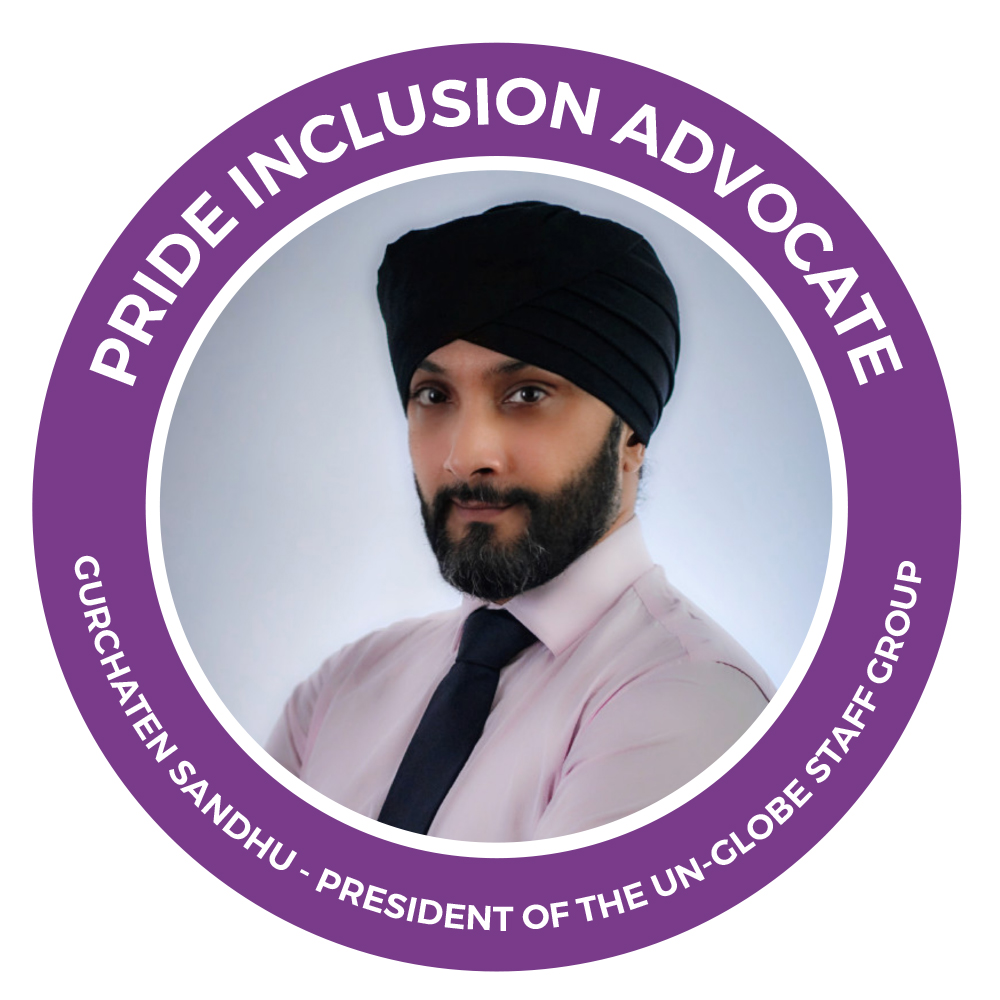
GURCHATEN SANDHU
President of the UN-Globe Staff Group
You were born into an Indian Sikh family in the UK. What particular challenges did you face in coming to terms with your sexuality?
I grew up at a time when homophobia was rife both in the British and Punjabi communities: in fact, the word “gay” in Punjabi was hardly ever heard, because, like many things that were thought to be shameful, it was never discussed. I was about 13 when I became aware that I was attracted to men. When I realised these feelings had a name, I didn’t want to be gay. The worst thing for me, really, was that I continued to deny myself, even though I knew I was gay.
Yet, my first experience of discrimination wasn’t because of my sexuality, but because of my race, ethnicity and faith. These parts of me are visible: I can’t hide them like I can my sexuality.
Growing up, I always wanted to be white, straight, blond-haired and blue-eyed. The opposite of everything I was. It was a constant internal identity battle, between who I really was and who I was told to be. This feeling of shame of who and what I was was amplified by feeling guilty for being ashamed.
I moved away from home and finally gave myself the freedom to explore my sexuality. Armed to the brim with toxic masculinity: misogynistic, homophobic and transphobic and repressing my emotions, I stepped out into the queer community! I thought I had come into my own: I had accepted being gay and was out amongst close friends. However, I was still struggling with deep levels of internalised homophobia. I would cloak my sexuality by dialling up my masculinity; I would pride myself on passing as straight; and I would avoid befriending very feminine men. Deep down inside, I still wasn’t OK with being gay.
It wasn’t until I plucked up the courage to see a psychologist and face my demons that things started to get better. Seeking help was the beginning of the making of me: my psychologist helped me unpick and unlearn all that hate and homophobia I had internalised.
How important do you think being “out” at work is – not just for the individual but also for the organisation they work for?
Coming out in in a large organisation such as the UN is not easy, especially for people of colour and from diverse religious background. Not everyone can be open and it shouldn’t be expected either from society. Our lived realities are different from each other. Is it safe to come out? How do we express our multilayered identities when culturally we prescribe to heteronormative narratives? In such circumstances, we must talk about “coming in or letting in.” By letting in, we are inviting a person into our space and sharing our sexual orientation, gender identity, and/ or sex characteristic. In this way, it is not about seeking validation or approval it is about acceptance.
You are President of the UN-GLOBE staff group. What does UN-GLOBE do?
UN-GLOBE was established in 1997 in response to the need for better information and knowledge exchange about issues in the UN among LGBTIQ+ people. UN-GLOBE’s goal is simple; the inclusion, equity and non-discrimination of LGBTIQ+ people in the UN System and its peacekeeping operations. To achieve this goal, UN-GLOBE advocates for inclusive and equitable employment conditions; diverse, safe and enabling working environments and cultures; and, lastly and more importantly, the representation and engagement of LGBTIQ+ people. “Nothing about us, without us” is part of UN-GLOBE’s DNA.
What we do at UN-GLOBE is central to making the UN a diverse, thriving and inclusive workplace. Without UN-GLOBE the process to make a multilateral institution truly LGBTQI+-aware would have been slow, and, dare I say, even daunting.We have not just changed policies, we have brought about cultural changes. When people come into the UN from different cultures and backgrounds – chances are they may have been told that identifying as a LGBTIQ+ is wrong or can be punishing to their career. We are working to dispel such prejudices in the UN. Just because it is the UN, one buys into the myth that everything must be right. Like any other organisation, we too have our challenges.
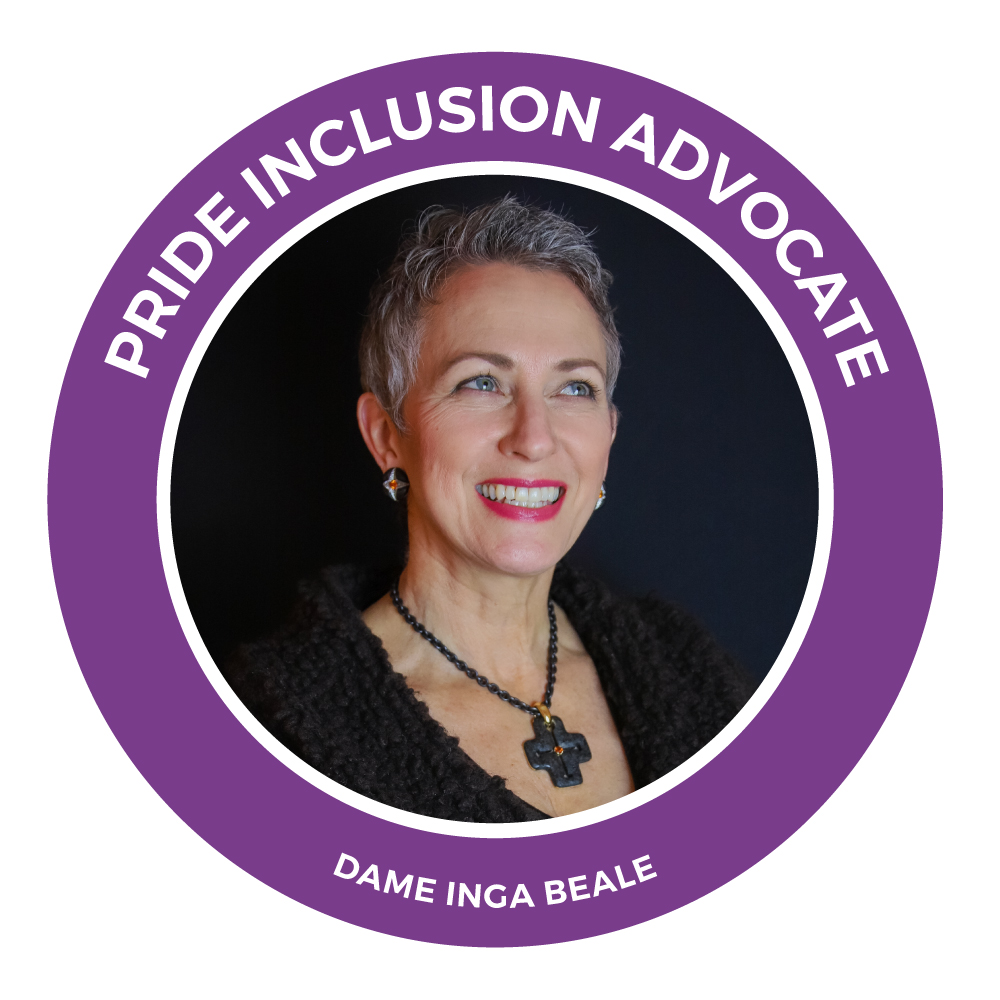
DAME INGA BEALE
Former CEO of Lloyd’s London
When you entered the insurance industry in 1982, the industry was largely dominated by men. Did you encounter any prejudice?
There was prejudice around but it wasn’t the key influence for me. I just felt I didn’t belong, that I was different, and I so wanted to be one of the “guys” that I found myself adopting male behaviours to fit in and feel more accepted. Looking back, I realise that anger was building up in me although I wasn’t really aware of it at the time.
You helped set up Pride@Lloyds, an LGBT resources group. How important do you think it is for people to be “out” in the workplace?
It took me many years to realise it was much better for me, for my partner, for my employer, to be “out” at work. After hiding that I was in a lesbian relationship, when I finally came out I felt a weight had been lifted. No more pretence or concern about being found out. No more wasted time and energy in making up stories or excluding my partner from work-related activities. My whole life – personal and professional – became richer.
And later in 2013 when you were appointed the first female CEO of Lloyds of London how had attitudes changed from when you first entered the industry?
Things had changed a bit but when I looked around the world and hardly saw another female CEO in the insurance sector it was apparent that there was – and still is – a long way to go to ensure we have equality in the workplace. And when I had a conversation with a 30-year veteran of the Lloyd’s market who didn’t dare to mention at work that his son was gay, I realised we had to do some serious culture change around acceptance of, and respect for, people who are different to you.
In terms of equality and acceptance we have certainly made great progress. But what challenges lie ahead?
We must continually fight to protect equal rights and strive for equal opportunities. A current shocker for me is how easy it is for certain people to attack trans rights and to marginalise a part of our LGBT+ community that we should be standing by and supporting. Also, the Covid pandemic has brought stresses and strains for most of us but when I read recent research that four out of five young lesbians say their mental health has got worse through lockdown and that women all over the world will be more negatively impacted by the pandemic than men, sadly there will be all sorts of inequalities to deal with in the future.
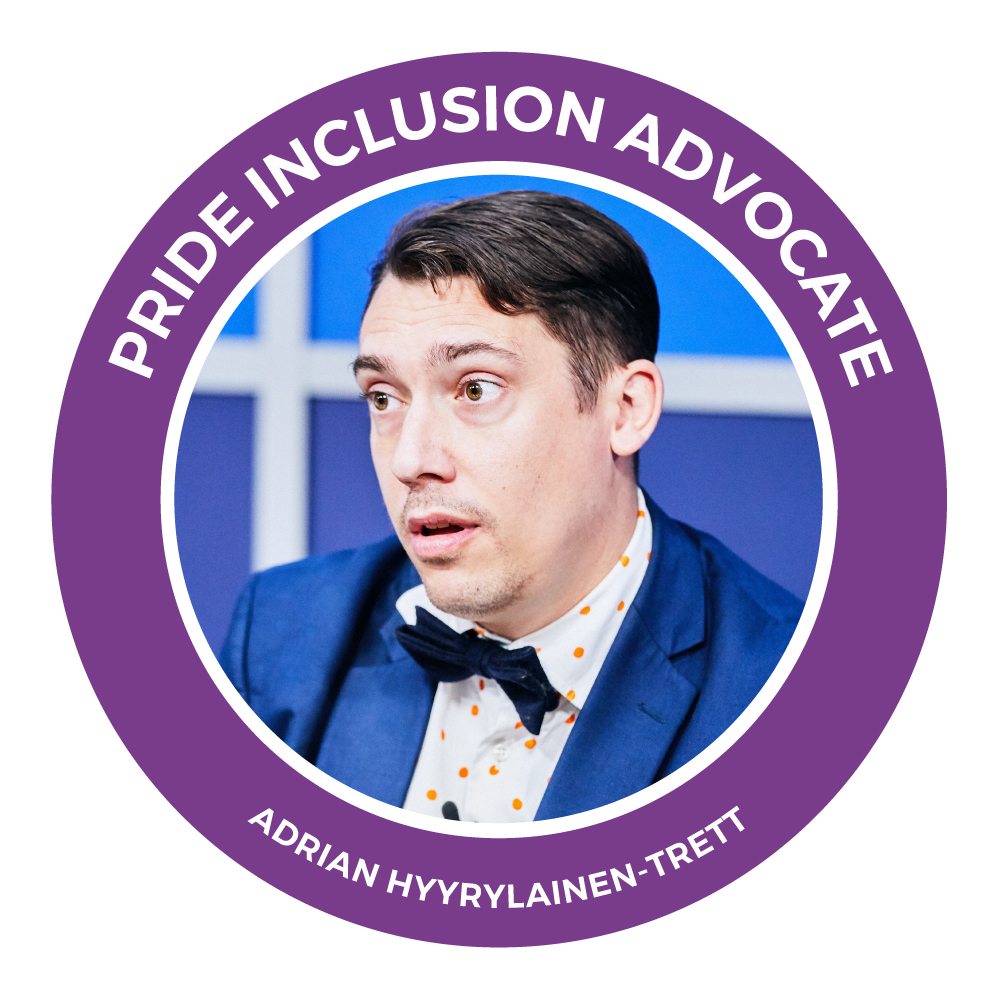
ADRIAN HYYRYLAINEN-TRETT
Global & UK (Inclusion & Diversity) Relationship & Membership Development Manager at the Employers Network for Equality & Inclusion (ENEI)
The aim of enei is to promote equality and inclusion in the workplace. How does enei implement this?
Enei’s promotion of inclusion is implemented by our USP of covering all protected characteristics plus specialist inclusion topics which are not necessarily covered by legislation and weave them together into strategic plans whereby “intersectionality” is key to bringing equality and inclusion across all diversities.
The plans are assisted by our benchmarking tool TIDE (Talent, Inclusion & Diversity Evaluation) which puts a “mark in the sand” on where your organisation is at. We then look at where perhaps your challenges or struggles are and create initiatives, projects, plans and other workplace strategies to improve your score across eight key areas of an organisation which will improve your overall percentage on the TIDE scorecard.
What benefits does having a diverse and inclusive workplace bring?
It’s true to say that having an inclusive workplace allows the employee to work in psychological safety, bringing their authentic self with their work colleagues, especially when identifying from any under- represented or minority group which includes being LGBTQ+. From the employer’s perspective, there is a well understood motto that if employees are happy, they are more likely to be productive, bring different views and knowledge to the table and therefore your business benefits.
What has been your proudest achievement?
To be honest, I’m going to have split this answer into two. From a very personal perspective, being the first openly HIV+ candidate to stand at a UK general election is an intensely personal story, something nobody can ever take away from the history books and I hope it will have enabled a discussion for which future generations will have less stigma to deal with by my openness and authenticity.
From a community perspective, being heavily involved in getting same-sex marriage legislation onto the UK statute book was something I chose to lead, not because I at the time thought it would benefit me, but more importantly the LGBTQ+ community who would have equal rights to love and marry who they wish. #Loveislove and that should be available to every human being whatever their sexuality, and to have led that campaign by writing and then speaking on the motion at the Liberal Democrat Federal Conference in Liverpool in September 2010 which started the journey to legislation.
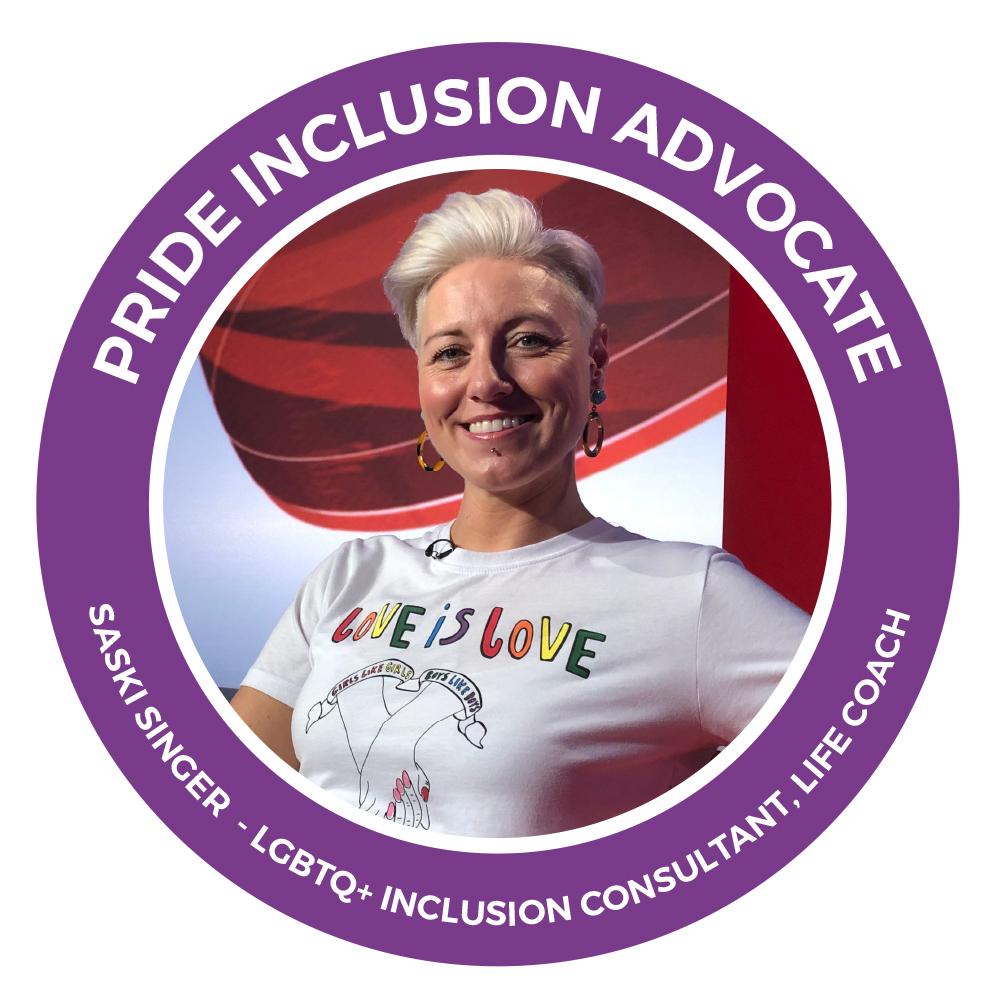
SASKI SINGER
LGBTQ+ Inclusion Consultant, Life Coach and Official Pride Host
How important do you think it is for an LGBTQ+ person to be “out” at work?
When a person can be their true authentic self in everyday life and work, they can be the best version of themselves. This is why I take every opportunity to positively promote people from the LGBTQ+ community with the media and through all strands of my work. Benefits of visibility for an organisation include increased staff productivity and staff retainment; it can also see increased profits from valued LGBTQ+ customers and allies. Most importantly it creates a positive reputation for having an inclusive workplace.
What steps can an employer take to create a genuinely inclusive and diverse work force?
Quick tips, from my CPD-accredited Everyday Pride Training programme – implementing mandatory LGBTQ+ Inclusion & Diversity training: updating their policies to be in line with the Equality Act with examples, i.e. stating they will not tolerate racism, sexism, or homophobia, biphobia and transphobia (HBT discrimination); employing diverse talent; creating Allyship programmes and Diversity Networks which will help to create inclusive environments.
In the past years we have seen great advances in LGBTQ+ rights both in the workplace and in the wider community. What else needs to be done?
Ultimately, tackling discrimination is all of our responsibility at various levels and this is why Allyship is so important. We have come a long way; however, people can become complacent with the LGBTQ+ rights we currently have. Sadly, HBT discrimination and crime reports are still high. This shows that there needs to be compulsory LGBTQ+ education and awareness in schools and the workplace. Laws need tightening up, especially with a ban on conversion therapy and more trans and gender non-conforming rights in the UK (and the world!).
What has been your proudest achievement? And what do you consider your greatest challenge?
Apart from being a proud mum, as a Londoner, hosting the “triple three” at Pride in London 2019. I opened the Pride March with running commentary on their podiums for the parade, then hosted on the Trafalgar Square Stage, finishing off with hosting on the Diva women’s stage at Leicester Square. As an out and proud lesbian and influencer, being visible on the Trafalgar Square Pride stage, asking my LGBTQ+ Siblings to stand with me against HBT discrimination and to be proud of who they are everyday, whilst seeing them cheering back and waving their Pride flags, is a moment I will never forget! Having “Everyday Pride” for everyone is the challenge but I’m working on it!
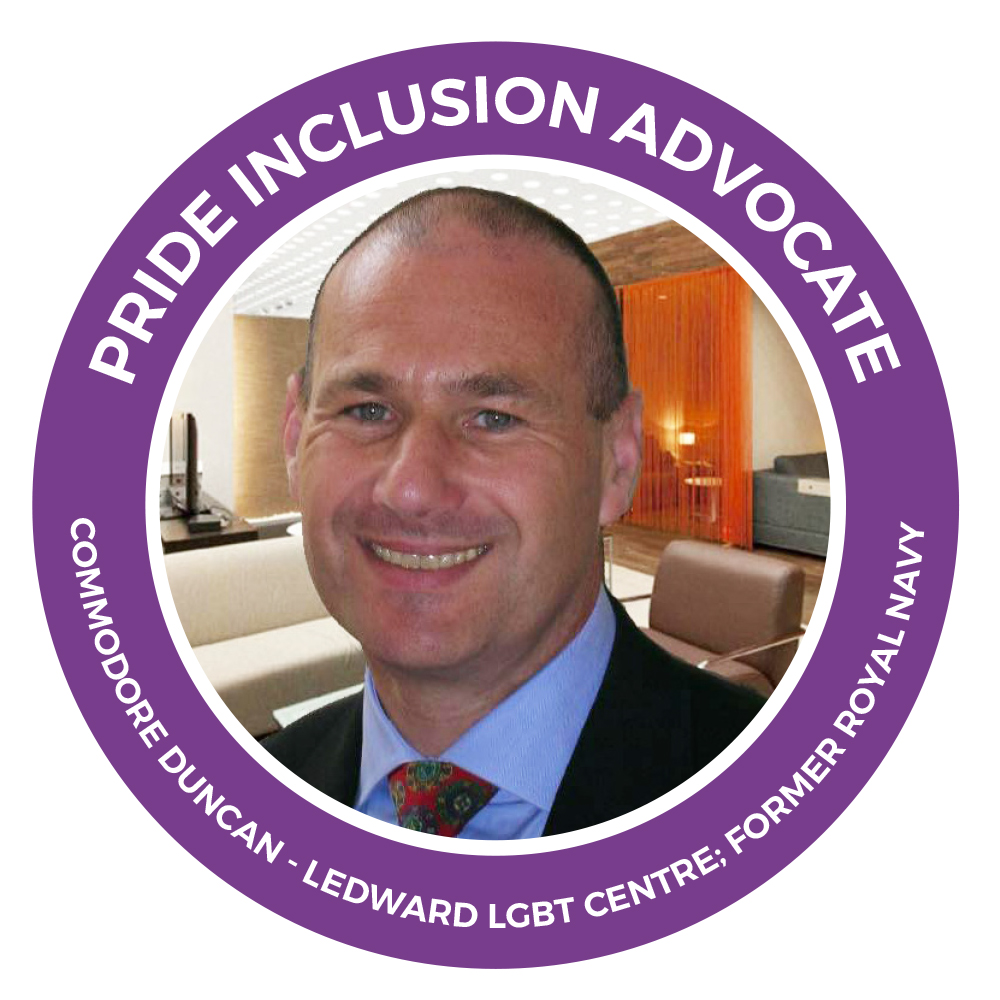
DUNCAN LUSTIG-PREAN
Ledward LGBT centre; former Royal Navy
What was life like for you – and other gay men and women – serving in the forces before 2000?
People lived in constant fear of the knock on the door from the military police and the days of intrusive interrogation and humiliation that would follow. This could even include forced medical examinations with tests which are now condemned in the world at large as torture. People were thrown out of their careers and lost everything; not for anything they had done, but for who they were.
Why do you think it is so important to be yourself as an out gay man or woman?
People perform their best in the workplace when they are happy and content. Being at ease and feeling confident to be who you are makes you perform better. Every employer should welcome and encourage that. If an employer fails to recruit from the entire available pool of ability because of bias or because some people do not come forward because they perceive them to be an “unfriendly” employer then they squander their resources. This makes no business sense. Achieving a properly diverse and inclusive workforce is not just the right thing morally to do; it is also the efficient thing to do.
The Ministry of Defence has recently agreed to return medals to those service men and women who were stripped of them after having been dismissed for their homosexuality. Is there anything else which can be done for these veterans?
I was delighted to be able to assist with this campaign which restored the first medal in 2019 and set the precedent. But while medals are important there are more practical ways in which the Ministry can make a difference to those who were so harmed by the country they served with honour. There must be a proper individual review of lost pensions and leaving gratuities for those impacted by the ban. Individual cases may need specific financial help. I am not talking about vast amounts or compensation. But I would expect to see ex gratia payments, in accordance with the military covenant, for those who were so badly let down.
So much has been achieved since 2000. What remains to be done?
I applaud the Armed Forces for the work they have done which rightly has gained their recognition among the top 100 Stonewall employers. Of course, there is much more to be done as there is in the rest of society. Top down leadership, proper consultation and staff support and role modeling are key. Never forget the power of leading by example as an LGBTQ+ person who is prepared to stand up and be counted.
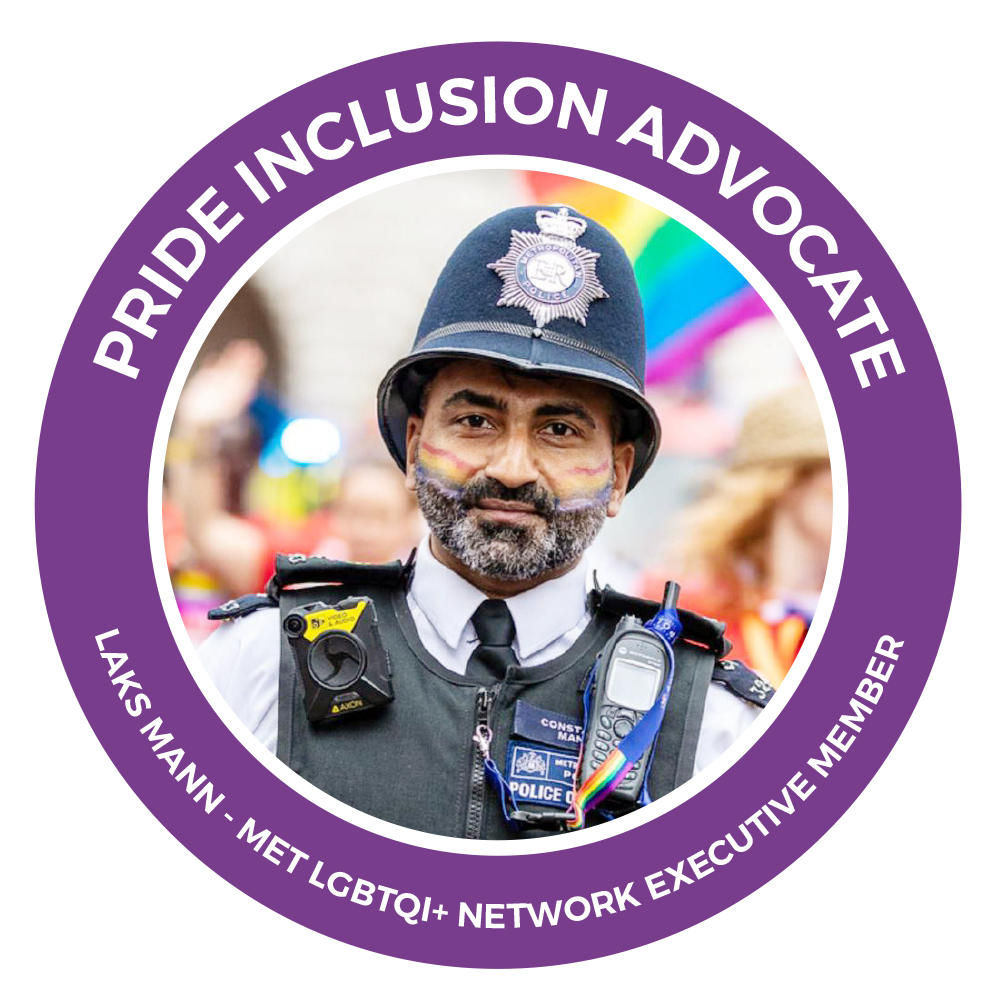
LAKS MANN
Met LGBTQI+ Network Executive Member
What does your role as Equality, Inclusion and Diversity Advisor for the London Mayor involve?
My role involves advising Deputy Mayors and subject matter experts at City Hall on policy formulation, strategic interventions and community engagement activities. I advise through an intersectional lens of race, ethnicity, faith, LGBTQ+, and working-class lived experiences.
What is the Met doing to promote diversity and inclusion both in the force itself and in the wider community?
The Met has a number of Staff Support Associations including the Met LGBTQ+ Network – where I’m on the Executive Committee as the Intersectionality & Community Engagement Lead, and the Met Police Sikh Association – of which I’m an active member. These staff networks are vital to embedding diversity and inclusion within the organisation, and many also do outstanding work engaging with London’s wider diverse communities. Regardless of the organisation, we all bring our own unique lived experiences, and so it’s important for employers to be truly inclusive and to fully embrace the diversity of their employees, particularly in a public-facing and community-serving organisation.
You are Secretary of the Intersectionality Working Group (IWG) of the National LGBTQ+ Police Network. What does that involve and how important is it to you, as being a self-described “British South Asian Queer”?
The key focus is to ensure that national decision-making includes greater diversity of lived experiences, and to amplify the narratives and challenges faced by marginalised communities, whose voices are all-too-often silenced and excluded. Initially we’ll be looking at particular barriers faced by Queer People of Colour (QPOC), and then plan to highlight other lesser-heard voices within the wider rainbow policing family. For me, it’s important to be visible as a British Desi Queer and to show that my cultural, ethnic and faith backgrounds are compatible with policing.
You’re also the founder of Gaysians. How does Gaysians help increase the visibility of the UK’s South Asian LGBTQ+?
My aim was to show that the UK’s South Asian LGBTQ+ community existed, in considerable numbers, and that we were a united family of artists, activists, charities and community organisations. I created Gaysians to be game-changer with a two-pronged strategy; to shatter stagnant narratives still within our South Asian diaspora, and also to show the wider LGBTQ+ community that Desi Queers would no longer be invisibilised,: that’s why the launch tagline of Gaysians was “Queer.Asian.Here.”
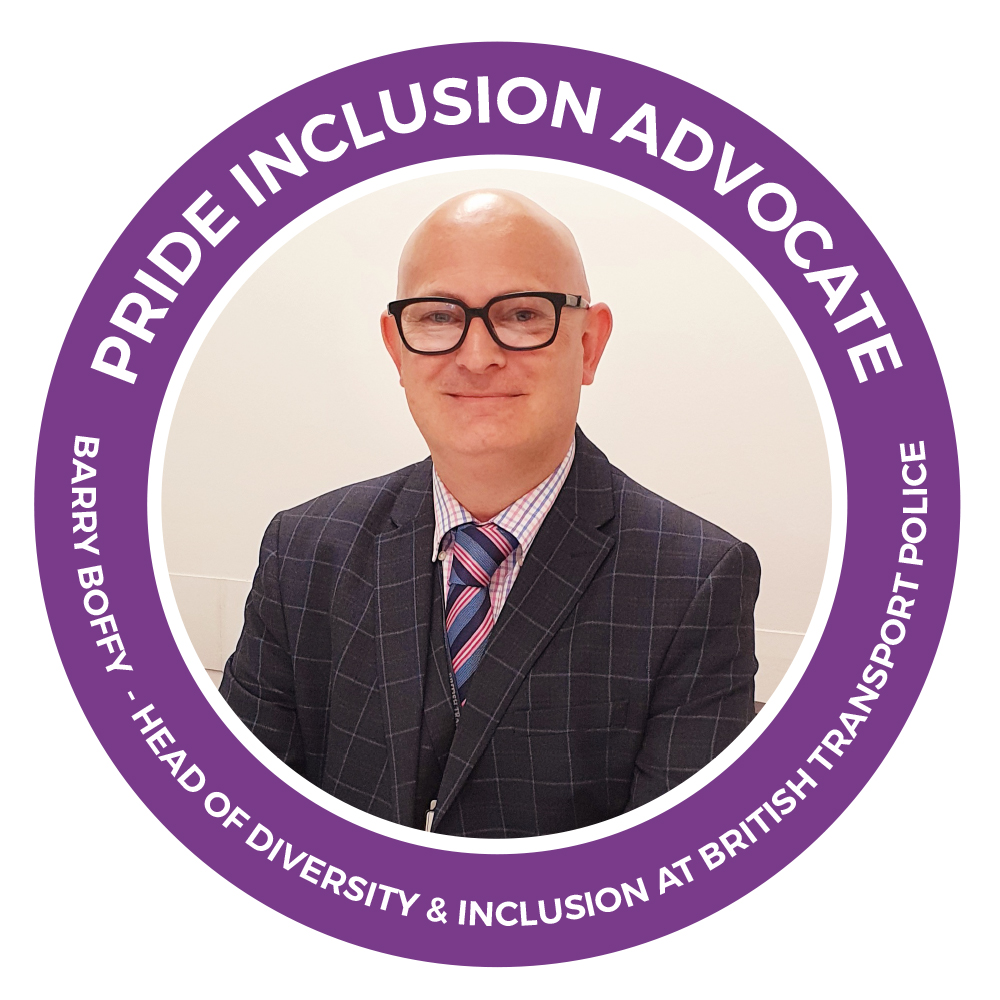
BARRY BOFFY
Head of Diversity & Inclusion at British Transport Police
How important is Diversity & Inclusion for the successful running of both a company (not just British Transport Police) and the well-being of individuals in its work force?
I would stress that Diversity and Inclusion are two different but very much connected areas. Having a diverse workforce is necessary to be able to police with the consent of the public that we serve. To police effectively in the UK, we need to be representative of the public and be able to recognise and understand the incredible diversity of the UK’s population and their very distinct needs.
However, creating a diverse workforce is not achievable or sustainable in and of itself and that’s where inclusion plays a vital part. We can only attract and retain that diverse workforce if we have inclusive workplace practices and a culture that actively values those differences. It makes good business sense, of course, (we want to employ the very best!); but not only that, it increases confidence in our understanding of diverse and sometimes vulnerable communities. By providing an inclusive and welcoming environment, we know that our people are happier as, ultimately, they feel valued for their difference and don’t need to hide a part of their identity to “fit in”.
How do you go about creating a welcoming and inclusive environment for your staff?
I’m incredibly proud to work for a police force that doesn’t just accept me for who I am, but actively supports me and provides an inclusive work environment where everyone is welcomed and accepted for who they are too.Not having to make the enormous effort of hiding my sexuality has really helped me in my career and it’s exactly that environment that I want to create for everyone else, no matter their background or identity.
However, I know that’s not always so easy for everyone. That’s where I have a responsibility to seek out those individuals who may struggle to feel “welcome” or accepted for who they are and look at what I need to practically do to help or remove any barriers. The ultimate goal is to create an inclusive workplace where everyone is valued and welcome. It’s important to encourage honest and open conversations about topics as diverse and “uncomfortable” as pronoun usage, microaggressions and the menopause – to name just a few!
What advice would you give a member of the LGBTQ+ community considering a career in British Transport Police?
My advice would be to always be your genuine self, all the time and unapologetically; as you’d be surprised how little it really matters. Being authentic is really liberating and will let you concentrate on the things that are truly important and give you the space to get on with what you need to do: performing to your very best and enjoying your career.
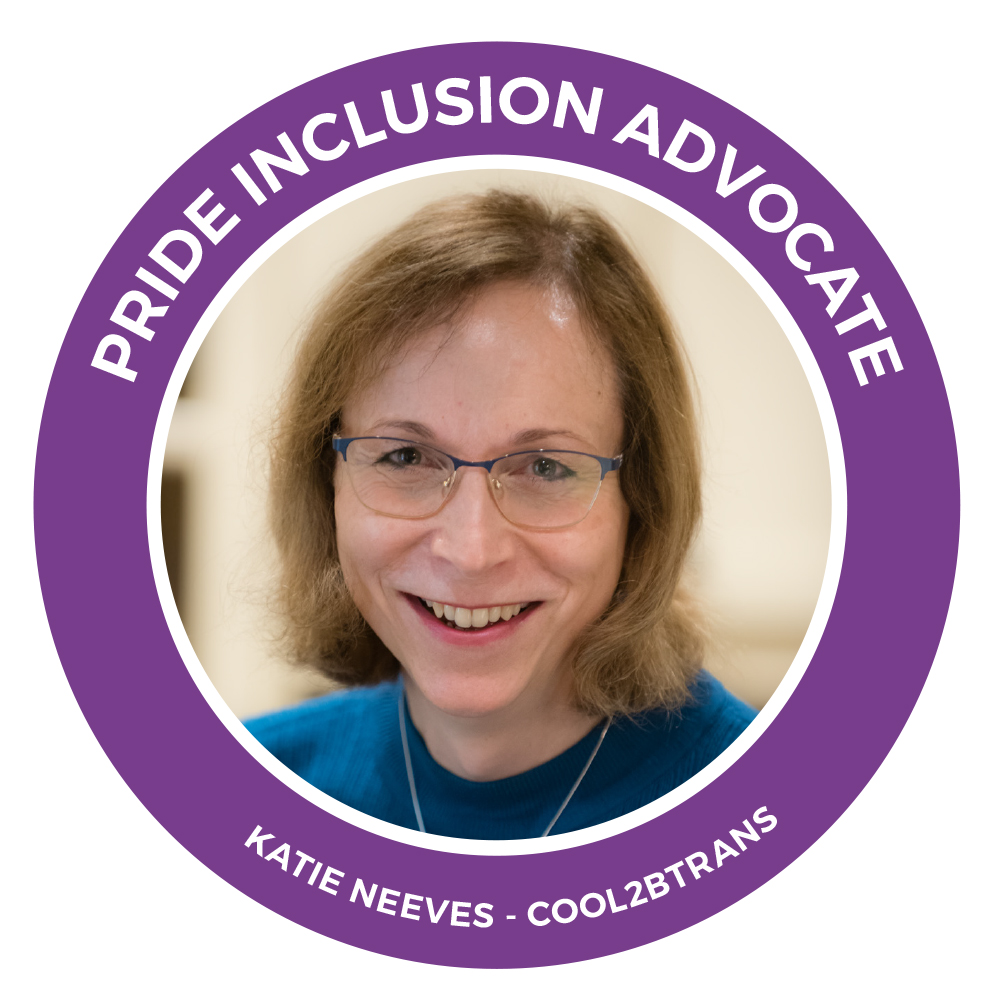
KATIE NEEVES
Cool2btrans
What does your mission as a trans ambassador involve?
I’m on a mission to do two things: (1) to reach out to other trans people and to let them know that it’s OK to be trans – because it is! So many trans people don’t know that (especially at the start of their journey) and they put so much pressure on themselves to conform to how others want them to be. They think their world will collapse if they admit to themselves that they are trans. I’m here to tell them that the world will let them in. My world has expanded since the start of my transition and I’m loving my new life, my best life!; and (2) to educate cisgender (non-trans) people on trans issues and to show them that trans people are just ordinary people who want to be happy – just like everyone else!
You came out on social media – including to your clients as a professional photographer. What reactions did you receive?
While I lost a few friends and clients, the vast majority have been super-supportive. After publishing my coming-out video, I was inundated with hundreds of messages of support. It was overwhelming. I felt so loved and it’s been the same ever since.
What are you doing to prove the message that it’s “Cool 2B Trans”?
The key to happiness is in living an authentic life. I didn’t want to be trans. No-one chooses to be trans and most people fight against admitting it to themselves. I am certainly not trying to persuade them to be trans (as that would be both pointless and impossible), but I do want to send a positive message to them to show them that it really is OK to be trans. I chose the word “cool” as it sounded far more positive than just “OK”. I also want to show that I’m cool about being trans and I want cisgender people to be cool with trans people too.
What more remains to be done about awareness and acceptance of trans people?
Awareness and acceptance of trans people is definitely increasing; however, there are some notable areas of concern. Well-funded and well-organised anti-trans groups have infiltrated all the main UK political parties and they are currently trying to change policies in order to discriminate against trans people. They have also been seeking to make life harder for trans people (particularly trans children) through well-funded court actions. This is completely out of sync with the views of most people in the UK, but they have friends with considerable influence, so we must all fight against this. We must not stand by and let trans rights be rolled back, but, as we are such a small minority, we can’t do this on our own. We desperately need the support of our cis allies now more than ever.
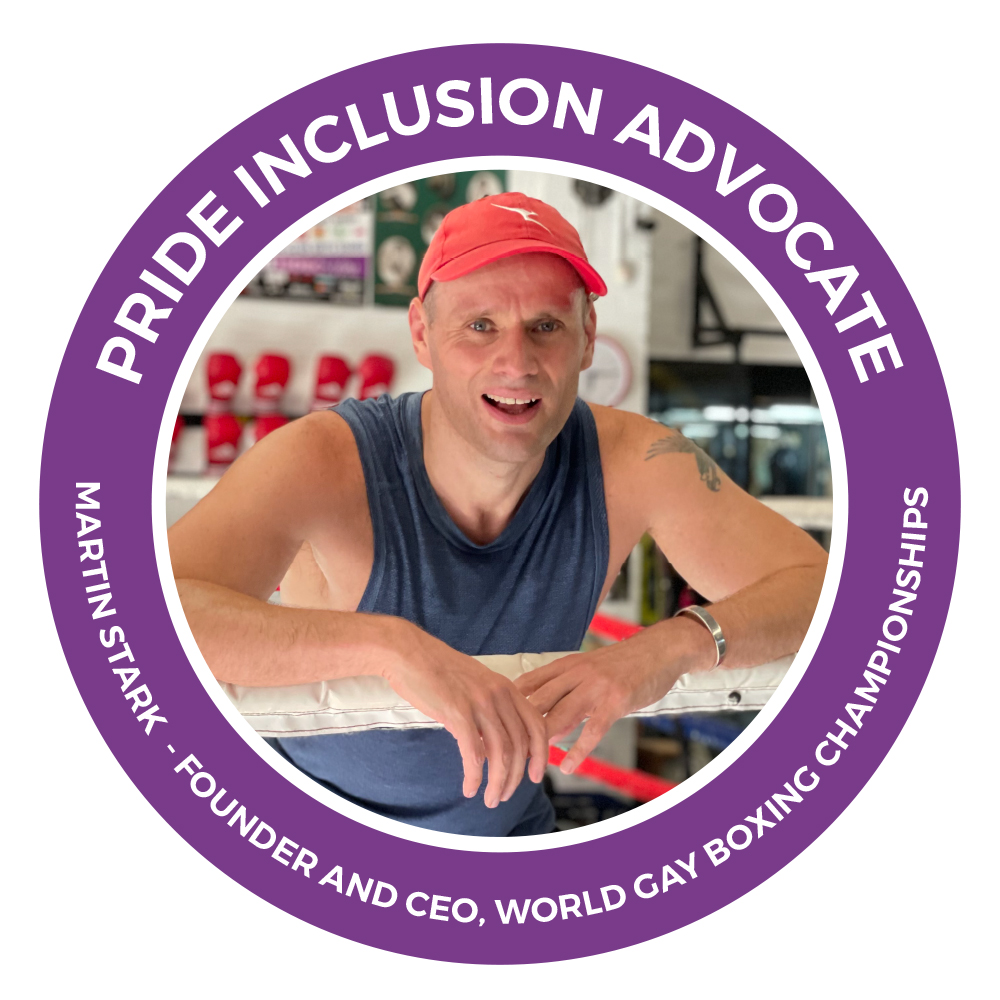
MARTIN STARK
Founder & CEO of The World Gay Boxing Championships
What inspired you to found the World Gay Boxing Championships, to be held in Sydney in 2023?
I admired the successes of other LGBTQI+ sporting competitions and wanted to compete at a world event. After learning boxing did not form part of the sports for the 2022 Gay Games I decided to create the World Gay Boxing Championships (WGBC) and hold the world’s first LGBTQI+ inclusive boxing championships.
How welcoming was the boxing community to the idea?
The boxing community in Australia has extended the hand of friendship welcoming the LGBTQI+ community into the boxing community. Boxing Australia agreed to endorse our objectives and immediately released a statement of support.
Have you ever experienced any negative reaction to yourself as an “out” boxer?
The only negative reactions I have experienced as an ”out” boxer have been on social media and I don’t care what trolls think. It has been easy to be me in the sport and the President of Boxing NSW has become a close personal friend. My boxing coach is a good mate and staunch ally of the LGBTQI+ community.
How important is inclusivity in sport, both for the individual and for the wider community?
Sport provides health and wellness benefits. For example, boxing improves muscle tone and cardiovascular fitness levels providing the psychological benefits of stress relief, increasing levels of confidence and self-esteem and improved co-ordination. Inclusivity is important because it creates an environment where people feel welcome to participate without fear and harassment. Sport brings people and communities together creating a sense of belonging.
Personally and professionally, what has been your proudest achievement?
Professionally, my proudest achievement is the hard work of everyone on the Board of WGBC, turning a bold vision into a not for profit company and we are well advanced in the organisation of the world champiwonships. Personally, I am proud of the Australian and global LGBTQI+ boxing community and our allies training for the championships.
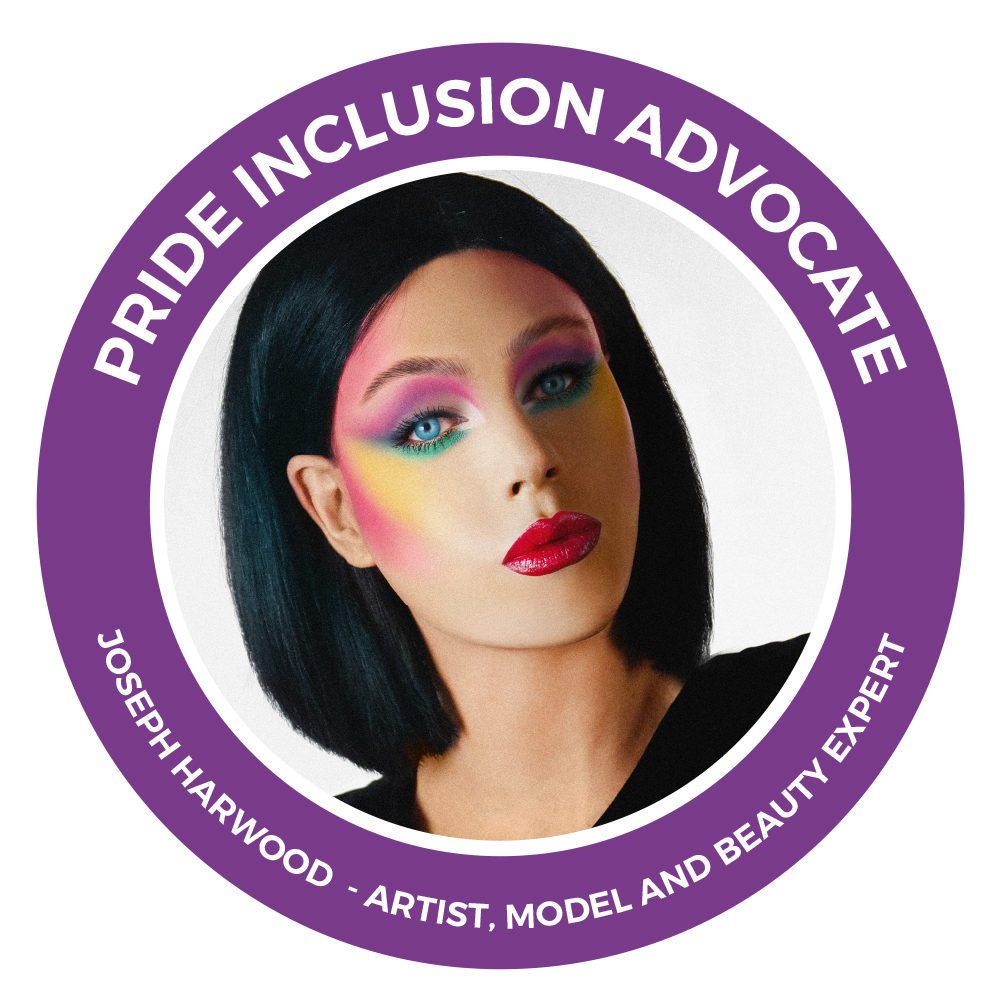
JOSEPH HARWOOD
Artist, Model & Beauty Expert
What is your definition of transgender?
If you break down the word, trans can mean “across” or “beyond” gender. It represents anyone whose gender has been outside of the contemporary expectations of male and female.
When did you first realise that you were transgender and what challenges did you encounter on your journey?
I was identified as male from birth, but my puberty was not at all what a boy should have gone through. I had a different experience because my hormones were not the same levels as you’d expect to be healthy, and I developed a medical condition called gender dysphoria. I had a list of negative physical symptoms that often get overlooked when we discuss gender, but I had really bad fainting spells and memory loss, I had headaches and my body was growing in a feminine way which included growing breasts. I discussed this with a doctor and was ignored on multiple occasions, I felt trapped within a body that didn’t look or function as expected.
I was physically very androgynous and this was something that I decided to embrace, and I was scouted as a model at 15. This allowed me to fund my own route to autonomy despite being ignored by medical professionals, and sadly this is not conventional at all. For many people who have no access to work through finding a balance in their bodies, they are stuck and it’s negligent. I was very fortunate and I play with gender expression in my art.
Trans visibility, and, to some extent, rights, have improved over the past years. What more still remains to be done?
Visibility has definitely gone up in the last few years but the type of visibility has not been strategic or positive. For me, there needs to be a diverse range of people who happen to be trans, in visible positions, in all manner of roles. People have attached trans people in the media to those who aspire to be famous or a celebrity, and how can someone with all the privilege of celebrity show the real trans experience?
It’s always been important to me to be myself and show that you can be successful even if you are trans because that is powerful in a way that arguing with a closed mind isn’t. We need to see trans people on TV doing the same things as everyone else, talking about the same bills they have to pay, making people smile and laugh and cry on a human level. We’ve got some way to go and I think we’re working towards that.
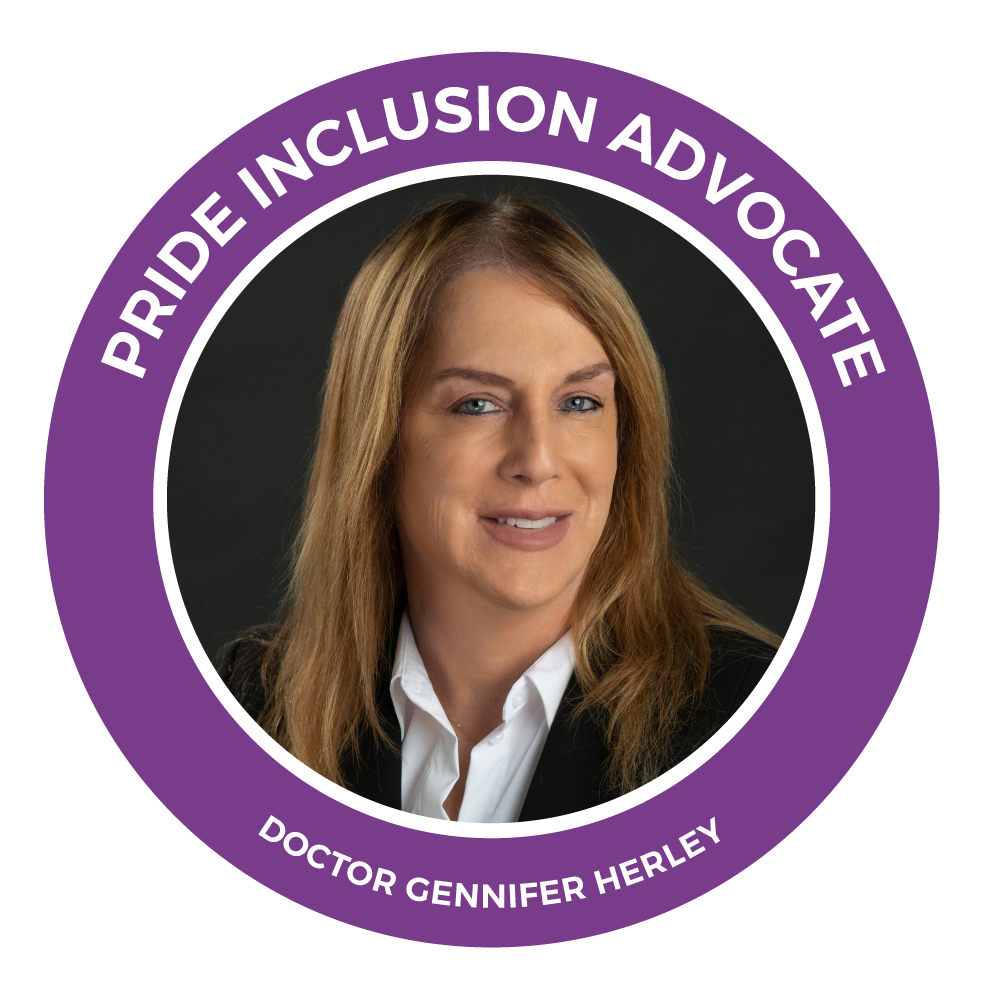
DOCTOR GENNIFER HERLEY
Founder and Executive Director of TransNewYork
What are the aims of TransNewYork?
TransNewYork’s mission is to educate, empower, and enhance the lives of transgender, gender non-conforming and non-binary individuals globally through advocacy, community visibility, human and social services, advance knowledge, and lifelong learning development of self.
While trans visibility has increased in the past few years, what more needs to be done?
We believe that educating the public is critical in moving the issues forward that affect our community. In order to go about that it is imperative that we get buy in and educate within both public and private corporations. We need to build and create leadership programs for our community. We need to be active in getting highly qualified transgender, gender non-conforming and non-binary individuals onto boards. Lastly we need to continue to partner with our allies to bring about acceptance and change.
There are many challenges to the transgender, gender non-conforming, and non-binary community. Kids who identify under the trans umbrella need much more understanding and acceptance. This needs to occur in schools as well as the home. TransNewYork is making an effort to work with our allies so that we may begin educating the school districts through parent teacher meetings.
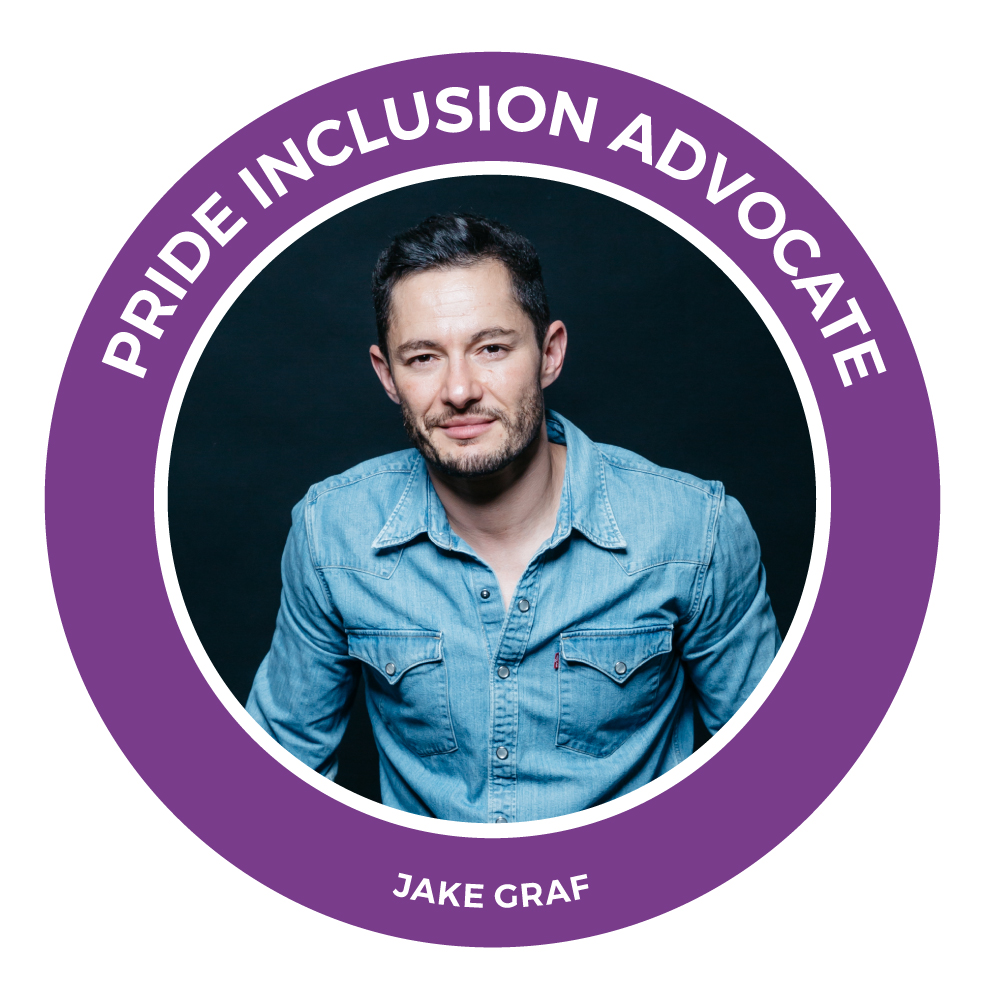
JAKE GRAF
Actor, Screenwriter, Director and Transgender Rights Activist
How important is on-screen representation of trans lives?
I grew up in 1990s London with zero role models, knowing that I was different but not knowing why, which was incredibly difficult for a small child. I felt like the only boy in the world who was born in a girl’s body, and the lack of on-screen representation and any points of reference made me feel utterly alone in the world.
The first time I met another trans man was when I was 25, and prior to that I didn’t think that trans people could ever find love, have a good job, or be happy, because I had never seen it in the media or on-screen. It is vital for trans people to see a diverse, beautiful and broad trans representation of our community to know that they can achieve anything that they want from a great career, to finding love, or even becoming parents.
You’re possibly the highest-profile trans male in the UK. Why do you think mainstream media tend to focus on trans women rather than trans men?
Trans women have been at the forefront of many our battles over the years, speaking out for us all at a time when it really wasn’t safe to do so. They have been fetishised for decades, the source of male fantasy, but equally held up as figures of ridicule, painted as men who have given up their masculinity in favour of the “lesser” female gender. There is a real fascination around trans women that just doesn’t seem to exist around trans men.
Still to this day, the vast majority of trans people transition after puberty, which often leads to transgender women being more identifiable than their male counterparts and as a result they are less able to choose a “stealth” lifestyle as readily as trans men have. That visibility has resulted in a higher level of scrutiny from mainstream media, which, whilst largely unwanted, has also meant that issues facing transgender women are much more highlighted than those affecting trans men.
In the past few years trans people have become more visible, and, arguably, more accepted. What challenges are there yet to meet?
There is still a pretty horrifying amount of transphobia out there, particularly online. We are seeing some very visible and prominent public figures worryingly comfortable in questioning our existence, validity and basic human rights. There continues to be a woeful lack of visible trans men, which is detrimental to the community as a whole. Waiting lists for trans healthcare run into years, with a government that is very divided on its treatment of trans people and trans women in particular. Trans young folk are still made to jump through hoops in order to get the basic support and medication that they need, with trans suicide rates rising as the help they need becomes harder to access. We are certainly more visible, but that comes at a price: every visible trans person I know receives daily abuse online, particularly when those are people with intersectional identities. That bullying quickly becomes intolerable. Progress has certainly been made, but there is a long way to go.
On a personal level what has been your proudest achievement?
I am really fortunate that I’ve got a fair few proud moments to choose from, something which I never dreamed would be the case when I was young! I am always blown away when other trans folk tell me that one of my films has changed their life or helped them live their truth, that means a huge amount to me. I am also proud that I’ve repaired family relationships that were damaged during the many years of misery and anger pre transition, and that I’ve found and married a beautiful woman who loves me. I think, though, that my very proudest achievement is becoming a dad to our wonderful daughter Millie. That really has gone beyond my wildest dreams.
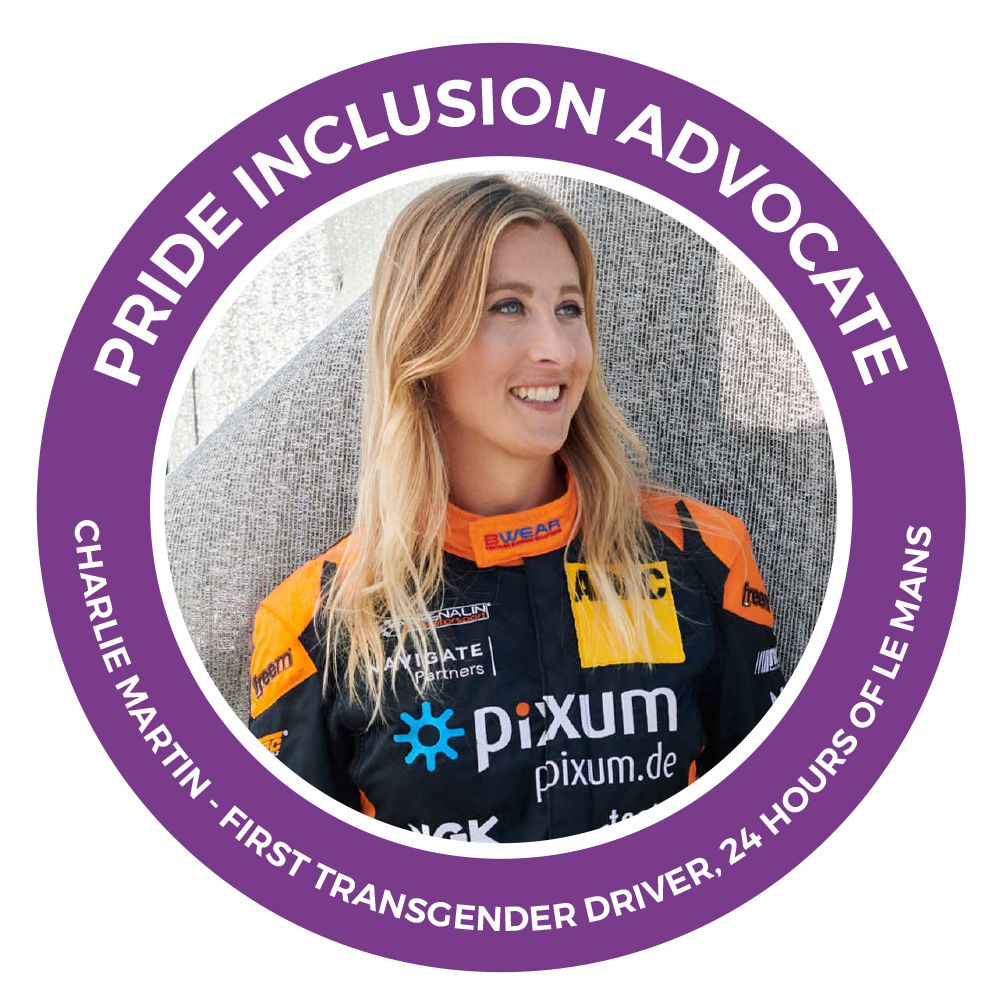
CHARLIE MARTIN
British Racing Driver
What challenges did you experience in being a transgender woman in what is traditionally looked upon as a male-dominated sport?
One of the hardest things was growing being unable to see any trans (or any LGBTQ+) visibility in motorsport, it made me feel as though I would never be accepted. So even before I began transition, the narrative that was hard-wired into my brain from a young age was already an obstacle. Another issue was a complete absence of awareness around what it meant to be trans: most people had never met anyone like me and I had to educate everyone around me.
Why do you think it is so important to be true to your own identity?
When we compartmentalise fundamental aspects of our personality, our behaviours and beliefs, it’s a painful experience. Even if over time you become so accustomed to living this way that you do it subconsciously, it’s tiring and prevents you from unlocking your true potential as a human being. When you live authentically, the feeling is reversed and everything flows – your thoughts, creativity, emotions, ability to focus, performance… it’s endless.
What have been your proudest achievements?
There are so many moments I’m grateful for throughout my career, but just being out there racing as the real me feels special. No matter what happens on track, each time I go out to race I know that I’m representing the community in way that can help educate people and increase empathy, whilst inspiring people to feel empowered by showing what is possible with determination.
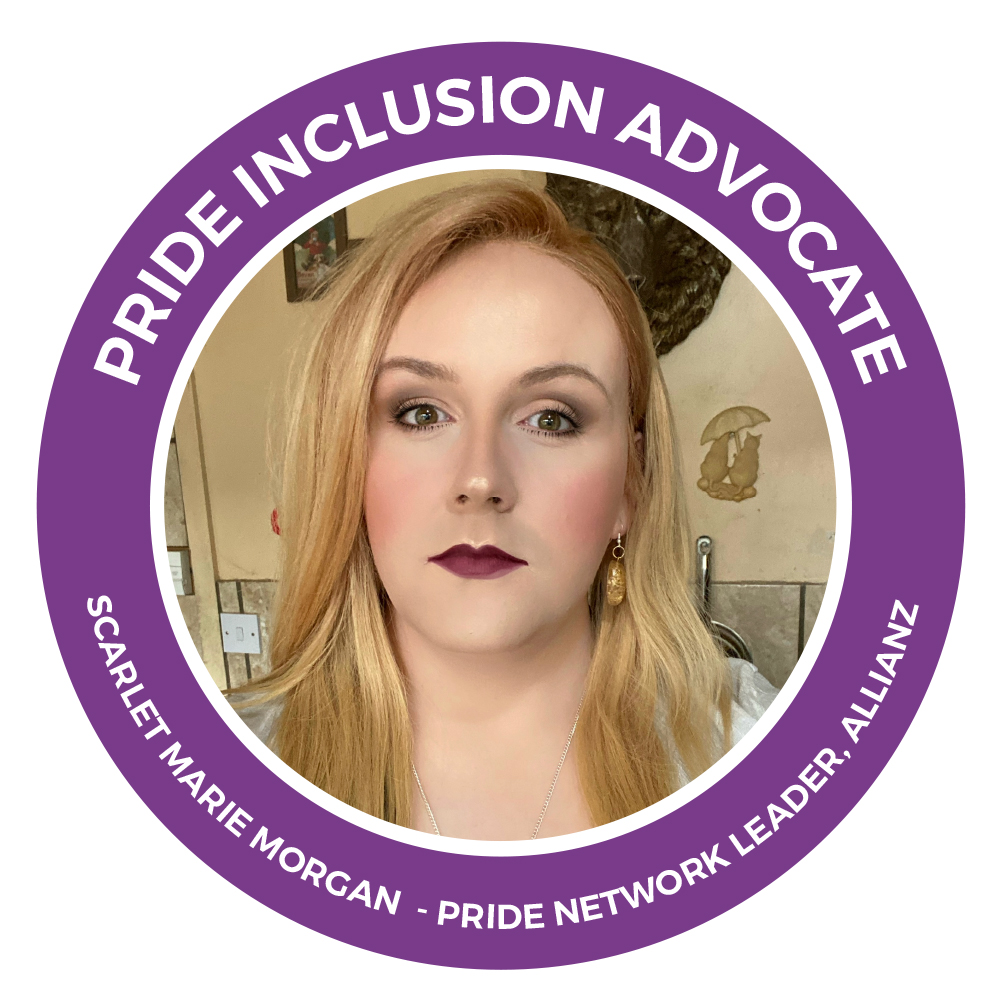
SCARLET MARIE MORGAN
Pride Network Leader, Allianz
You describe yourself as an ambassador for transwomen and transpeople in the corporate world. What does that involve?
Basically to change the bias around corporate workers and workplaces. The corporate world is full of some of the most incredibly talented and diverse people. It is no longer men in suits and woman sat on reception, it is now a career for everyone from all walks of life. It’s important to make changes in the corporate environment for the next generation to feel confident in being different and being able to apply for jobs in businesses they normally would steer away from. My own experience of being a transgender woman will hopefully inspire future transgender people to step out and not be afraid of making changes where they work.
When you came out as trans, what reaction did you receive from your work colleagues?
Honesty was applauded; it felt like I was being awarded for finally being myself and embracing myself. I was surrounded by love, support and have found that even with the challenges we were able to change things and really make a difference and lead the way to truly supporting transgender employees.
Over the past few years transpeople have become more visible, and, arguably, more accepted in the general and the corporate world. What changes should there still be to come?
I agree 100% with how more visible transgender woman are and accepted, but I do feel we can change what type of visibility. Every company can make posters and show a transgender woman or man standing proud and that is amazing, but for me I would love to see higher transgender people, a CEO or a manager, someone whose voice is not only heard but who has the power to make these changes themselves. You give a person with passion the power to change things, and you’ll be surprised how amazing that change can be.
What is the achievement of which you are the proudest?
Personally, finally living authentically. It’s a scary journey and there are so many more scary things ahead, such as raising money for surgeries and taking on challenges that I know are still there when the world re-opens, but that first step just to say you are you – anyone who does that in any way shape or form is my hero.
Professionally, raising awareness. I have had emails from people from across the globe who I have never spoken to or seen – some heart-rending stories of family members who lost loved ones. To know that in my story and in my pride and journey I am inspiring and helping people find peace, that to me is worth any price, any bonus

Certificate of Diversity practices
Together in solidarity we will be pro-active in bringing an end to pink-washing and tokenism towards the LGBTQ+ community during and after Pride celebrations and to build a sustainable inclusive future.
The CODP is awarded to organisations across the UK and around the world that have worked authentically towards creating LGBTQ+ inclusive workplaces.
Organisations with a proud and proven record of diversity and inclusivity will be deserving recipients of the Pride Life Certificate of Diversity Practices, the ultimate gold standard of LGBTQ+ accreditation, authentically respected as part of the Seal of Approval and Executive Leadership Programme.